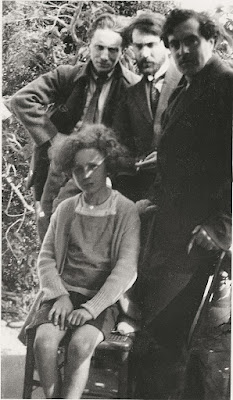Pergamon Museum
Pergamon Museum, Musee Insel, Berlin
Paul Murphy, Berlin, 2007
Musee Insel, Berlin, is home to several major German Museums. The Pergamon Museum is perhaps the most striking. In many ways a German version of the British Museum, it houses several key exhibits, the Ishtar Gate from Babylon and the Pergamon frieze from Pergamon in Turkey (a major Greek colony in Asia Minor, Pergamon itself was reckoned by the Greeks to be their major city apart from Athens). Obviously these great historical treasures, like so many of the treasures housed in the British Museum, didn't originate in Germany. No, in fact they were stolen from their respective countries. Now obviously these priceless treasures (a cliche made even bigger by the fact that these items reside here and not where they originated) should, like the Elgin Marbles - really the Parthenon Marbles - be returned from their place of origin. But are the Germans (or the British) going to do that? No sadly. They are a salient reminder of the main tragedies of Western territorial and cultural aggrandisement in the 19th and 20th centuries. The tragedy they underwrite is very like the lie that they promote: a culturally progressive Germany housing unbelievable priceless treasures of antiquity, promoting the ideal of Greek culture in Museums, literature and art. Obviously many German writers also promoted that ideal. Goethe in his writings, for instance his Italian journey promoted an image of the writer as preserving classical antiquity and thereby developing from it a new vision of a German national literature firmly rooted in the glories of the past. The Pergamon Museum can be compared to the Glyptothek in Koenigsplatz, Munich. For some time the King of Bavaria was also the King of Greece, hence the spectacular classical architecture residing in Munich. The exhibits in Munich, however, are not as spectacular as those in Berlin and the ghost of Heinrich Schliemann is possibly behind everything we can see.
For all that the Pergamon Museum is certainly spectacular. Like so much in Berlin, it is in need of an upgrade. London, by contrast is entirely fascinated by money, everything is built around the idea that things have to be paid for, that if a thing fails to be profitable, then it shouldn't exist. But Berlin still retains some of the refreshing vivacity, experiment, originality (also some of the more laughable excesses) of London in the 1960s. In that sense, a visit to Berlin is like a trip back in time. Some of the arrogance of German Imperialism, already broken, rusted and corroded, is being undermined, displaced by a new generation of Germans intent on making new, refreshing developments, realising that the lionising tendencies of their culture is finished, that they must begin again to create a future built on spectacular ironisation of their often dismal histories.

Comments